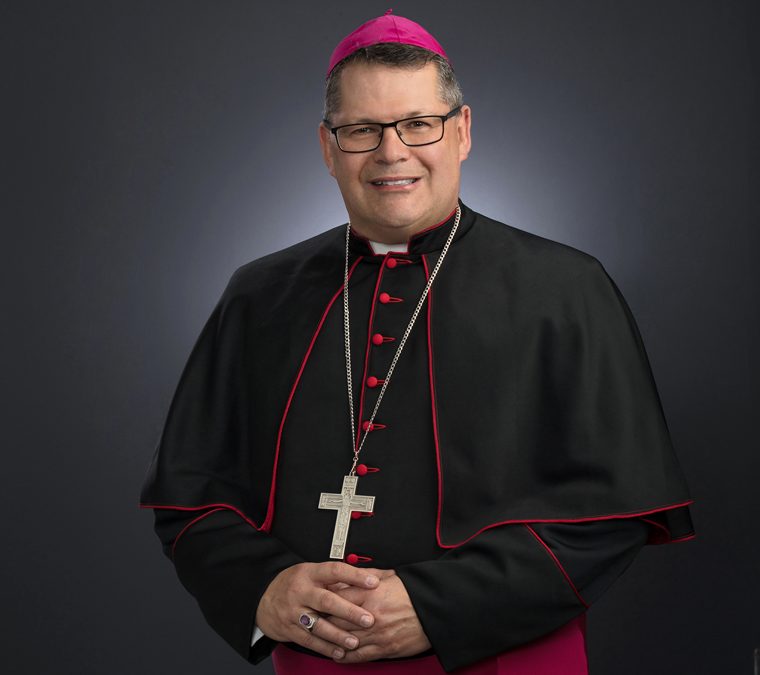We are already into the last week of October and soon what I consider the precious month of November will be upon us. As we prepare to enter into the season of saints and souls directing us in expectation of Christ’s coming again as victor over sin and death; and in a spirit of thanksgiving for God’s many blessings, I would like to share with you my homily message from this past Sunday—the 30th Sunday in Ordinary Time—focusing on what ultimately Jesus wants to do for believers:
In last Sunday’s Gospel reading, James and John—but really all Twelve Apostles, blinded by self-aggrandizement to the demands of following a suffering and servant Messiah, ask for the best places in the heavenly kingdom. The Gospel ends with these words: “For the Son of Man did not come to be served, but to serve and to give his life as a ransom for man” (Mk 10:45).
This week in the very next verse of Mark’s Gospel, we encounter Bartimaeus shoved off to the side of a road begging. Let’s be honest: It may be true that it is safer to be on the side of a road, especially if one is blind; but is it also true that it is easier to walk on by or to drive on by a person who has been sidelined! It signifies also that Bartimaeus’ life was going nowhere; after all, he is sitting on the sideline while life is going by.
As I learned just recently, the name “Bartimaeus” actually means “son of a respected one.” So, imagine this turn of the table so to speak as he sits in the dust looking for a handout. Not only is he most likely looked down upon by those passing by as a “loser” in life, but the fact he is there indicates that his very blindness was seen by his family as a moral defect. Such a notion is consistent with the belief of Jesus’ that those experiencing misfortune must have done something to be cursed by God. Consequently, family and friends, for their own self-preservation, cast them out of their lives lest they should be contaminated and come to suffer similar circumstances (similar to a leper or the story in John’s Gospel of the man born blind).
Now, sisters and brothers, you might think my analysis of today’s Gospel is a bit far-fetched, but notice what the crowd who is with Jesus is trying to do. Mark writes: “And many rebuked him, telling him to be silent” (10:48a). After all, why should the likes of him even speak to Jesus?! Yet, something happens in that moment. …The same Jesus who had rebuked his own disciples for their lack of faith recognizes in the voice calling out, “Jesus, son of David, have pity on me” (Mk 10:48b) … someone who although he can’t see physically is willing to make the leap of faith!
However, the story gets even better. … In order to get to Jesus, he needs to trust those same voices who moments ago were telling him to literally “Shut up!,” as they now called out:“Take courage; get up Jesus is calling you” (Mk 10:49b). In fact, in order to do so, he must throw aside his cloak—his last poor shred of possessions that served as a coat, sleeping bag and scrappy collecting rug for a few coins—and which now could be lost to the crowds, along with his dusty “bit of turf” that, like every beggar, he would have guarded so jealously—all because of one thing—“Jesus is calling you.”
And that is when Jesus asks him the same question as he did of his closet companions: “What do you want me to do for you” (Mk 10:51a)? Bartimaeus, aware of his poverty and disability, asks for nothing except that he may see, addressing Jesus reverently as “Rabbouni,” “Master.” Brothers and sisters, this form of address is only used one other time in the New Testament—when Mary Magdalene recognizes her risen Lord!
Jesus knew that the blind man already had the seeing eyes of faith, so he tells him that it is his faith in Jesus … in God … that has restored his physical sight—“Go, your faith has saved you” (Mk 10:52a). Again, one final detail. … No longer confined to groping his blind way around the place, Bartimaeus can “go” where he wants to, but his choice is to follow Jesus “on the way,” the way that leads to Jerusalem, the city of passion, death and resurrection.
Imagine now as one in the crowd (since in the Liturgy of the Word, it is God/Jesus speaking to us) what this means for us. First, Jesus is really asking each one of us, “What do you want me to do for you?” We have seen what responding to this question involves and the promise it also brings, so what will our response be and what must you and I do to get closer to Jesus? And secondly, how can you and I help others to come closer to Jesus? What prejudices … what selfishness … that clings to us prevents others from getting closer to Jesus.
Let me close by calling to mind words of a Carey Landry song that I remember from my early days as a priest. For me they sum up what this Sunday’s Gospel is meant to relate to us. The refrain goes like this: “Great things happen when God mixes with us. Great things happen when God mixes with us. Great and beautiful, wonderful things, Great things happen when God mixes with us.”





